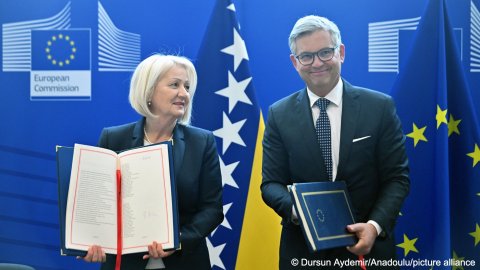EU and Bosnia Forge Agreement to Curb Irregular Migration
The European Union (EU) has recently taken significant steps to address the challenges posed by irregular migration. In a groundbreaking agreement with Bosnia and Herzegovina, the EU aims to enhance border security and manage the influx of migrants more effectively. This agreement comes amidst ongoing discussions about immigration reform and security measures across Europe.
Understanding the Agreement
The EU’s agreement with Bosnia focuses on several key areas to tackle irregular migration:
This cooperative initiative reflects a growing recognition of the complexities surrounding migration and the need for collaborative solutions that respect human rights while ensuring national security.
Impact on Irregular Migration
The implications of this agreement are far-reaching. As irregular migration continues to be a pressing issue, the EU and Bosnia’s partnership aims to create a more structured approach. By enhancing border security, both parties hope to deter human trafficking and exploitation, which have become rampant in the context of irregular migration.
Furthermore, this agreement aligns with broader discussions in the EU about immigration policies, including the need to balance security measures with humanitarian considerations. The collaboration is seen as a necessary step toward creating a comprehensive immigration strategy that addresses the root causes of migration while managing the challenges it presents.
Current Trends in Migration
The migration landscape in Europe is constantly evolving, with various factors influencing the movement of people. Recent immigration news in Colorado and California immigration news highlight the ongoing debates surrounding immigration reform and how different regions respond to these challenges. The EU’s agreement with Bosnia signifies a proactive approach to a complex situation that is mirrored in many parts of the world.
As the EU and Bosnia move forward with this agreement, it is crucial to monitor its effectiveness. Will it lead to a decrease in irregular migration, or will it prompt new challenges? Only time will tell, but the initial steps taken by these two entities show a commitment to addressing the issue head-on.
Broader Implications for Immigration Policies
The agreement between the EU and Bosnia is not an isolated development. It reflects a larger trend in global immigration policies, particularly in regions facing increased migration pressures. The need for comprehensive immigration reform is evident, and this partnership may serve as a model for other countries grappling with similar issues.
As discussions around immigration continue, keywords such as advance parole news and humanitarian parole news today emphasize the importance of understanding various immigration pathways. The EU’s proactive measures could influence policies in other regions, including the U.S., where recent Trump immigration news has reignited debates about border security and immigration reform.
Conclusion
The EU and Bosnia’s agreement to curb irregular migration is a significant step toward managing migration challenges in Europe. As nations grapple with the complexities of immigration, this partnership serves as a reminder of the importance of collaboration and comprehensive strategies that prioritize both security and humanitarian concerns.
In conclusion, the evolving immigration landscape requires continuous adaptation and cooperation among nations. The EU’s partnership with Bosnia could pave the way for more collaborative efforts in the future, ultimately fostering a more secure and humane approach to migration. As we stay informed on immigration news and developments, it is vital to support initiatives that balance the needs of migrants with the safety and security of communities worldwide.










